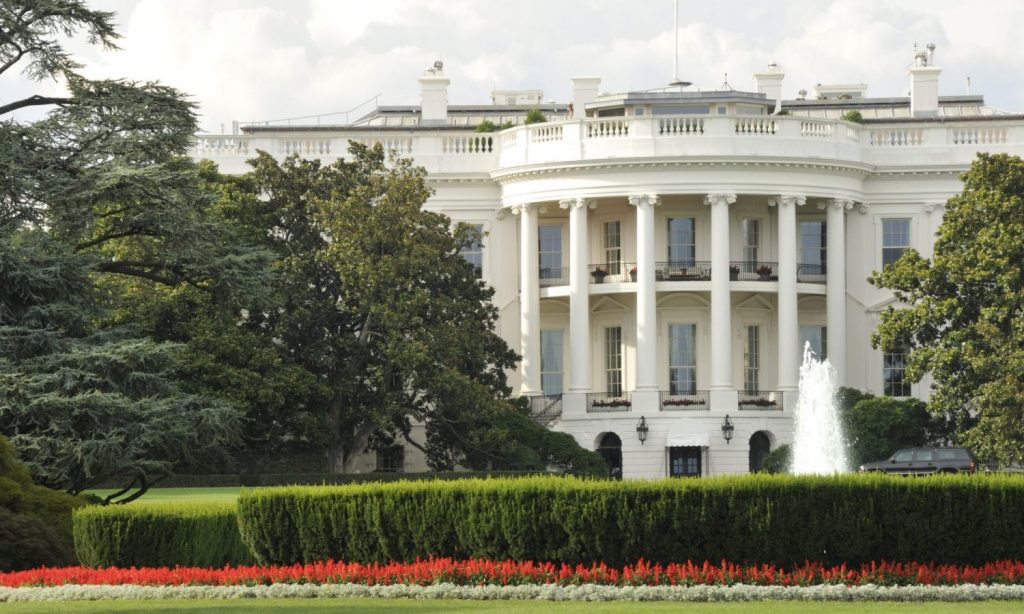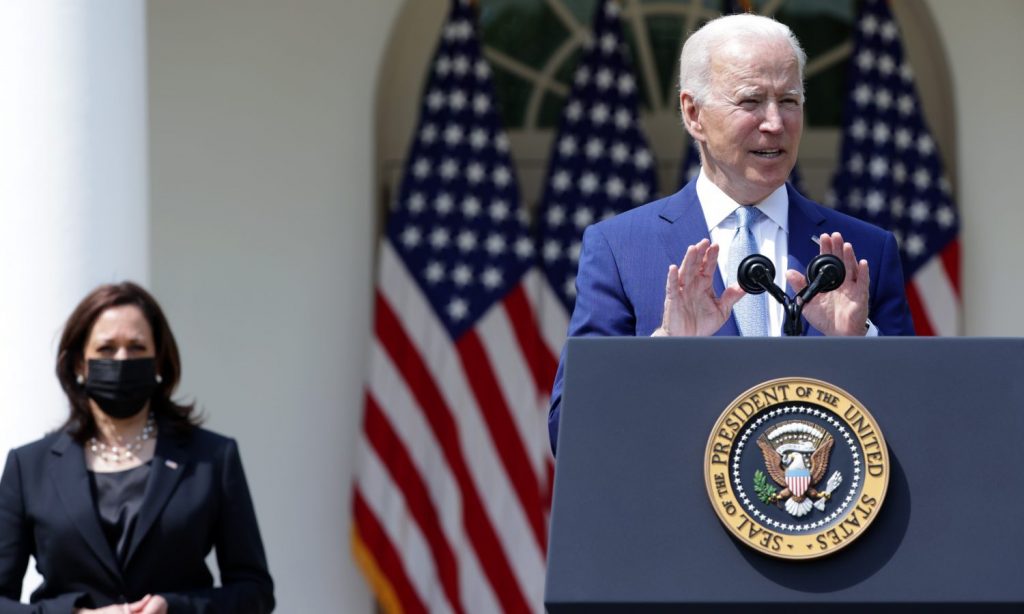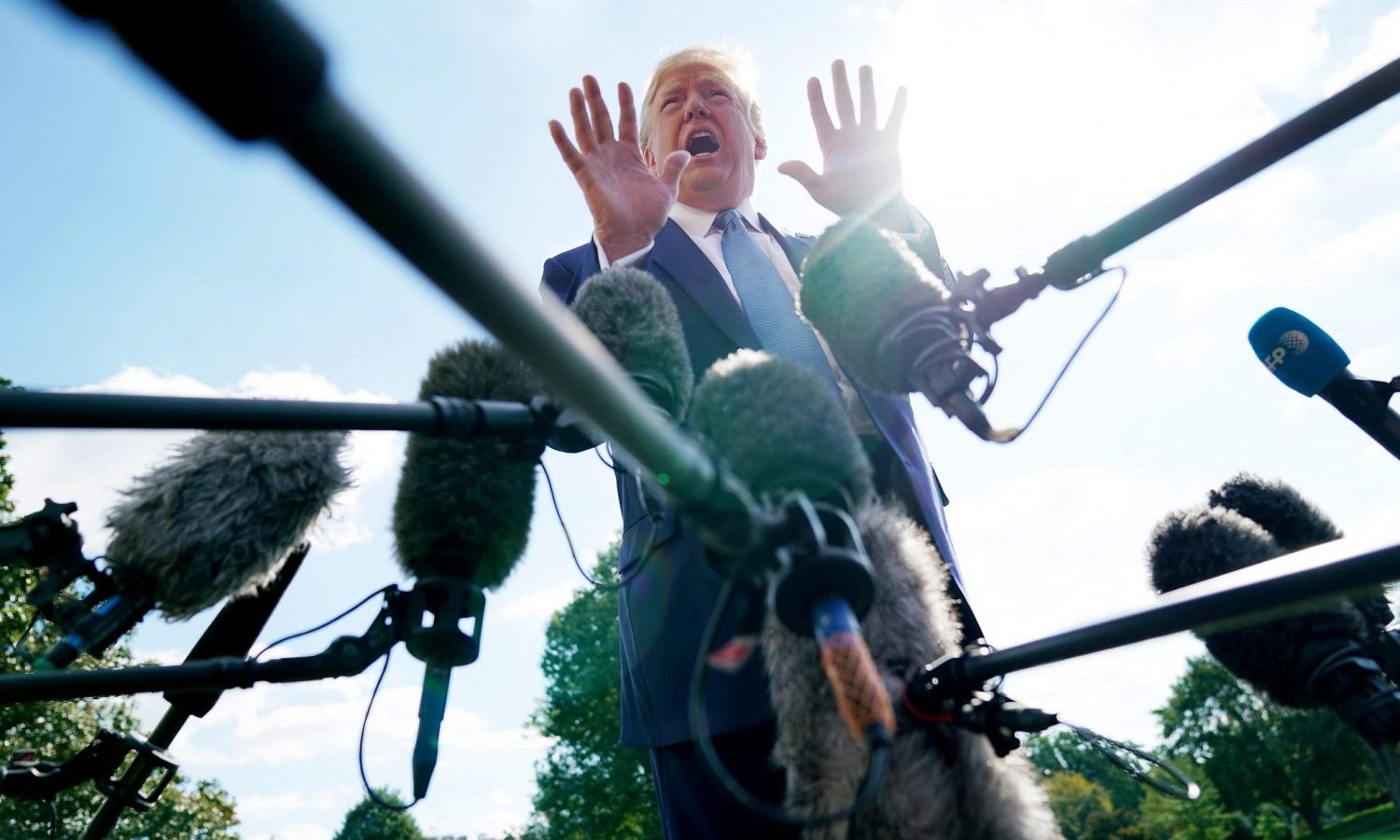John Hudak, a leading voice in the cannabis space and a senior fellow at Brookings Institute, sat down with White House correspondent Brian Karem to discuss cannabis, politics, and that time Trump revoked his press pass.
Additional writing by JJ McKay
Journalist, musician, rebel, and Playboy‘s Senior White House correspondent Brian Karem has lead a life that schoolboy dreams are made of. Karem is the lead singer of the Rhythm Bandits Band when he is not questioning the President and West Wing staff, or being a political analyst for CNN and his “Just Ask The Question” podcast. Sitting down with John Hudak , Brian Karem talks politics, Trump drama and marijuana.
In August 2019, the Trump White House suspended Karem’s press pass. Karem filed a lawsuit in response and on June 5, 2020, Judge David S. Tatel of the United States Court of Appeals for the District of Columbia Circuit ruled the White House Press Office wrongly suspended Karem’s press pass allowing Karem to continue to cover the president. In 1991, Kareem received the National Press Club Freedom of the Press award for refusing to reveal his sources in a story related to the killing of a police officer in Texas.[4][5]
John Hudak, a leading voice in the cannabis space and a senior fellow at Brookings Institute, sat down with Karem to discuss politics and marijuana.

HUDAK: How did you get to become a White House reporter and someone who covers the White House and national politics?
KAREM: I’ve been a reporter since 1980…something. I first covered the 1984 presidential campaign with Reagan. The first time I stepped into the briefing room was 1986, and I’ve covered national politics off and on for a variety of venues since then.
HUDAK: Were you always interested in journalism?
KAREM: I was always interested in writing. My family’s profession is mostly lawyers and judges, and I remember when I was a kid my uncle handed me a check and said “here go to law school.” And I tore it up, handed it back to him, and said, “I don’t want to.”
View this post on Instagram
I really wanted to write, and I had a really keen interest in seeing things as they happen. And that led me to journalism. Being able to see things as they happen and chronicle them and let people know what happened—I just felt more comfortable doing that than anything else.
HUDAK: You’ve covered multiple presidents both at home and abroad. How would you rate the first seven months of President Biden’s tenure?
KAREM: He had a low bar to reach because Donald Trump was the single worst president I’ve ever covered in my life. That said Biden stepped over that very low bar. I think one of the most impressive things Biden has done in his first seven months is trying to get the atrophied muscles of bipartisanship working again. I sat through four years—maybe 200 weeks—of Donald Trump telling me it was infrastructure week and he did nothing on infrastructure, and this administration has. And its response to the COVID crisis has been rather impressive.
View this post on Instagram
All in all I think (President Biden) has done some really good things. That being said, I’m still concerned about how he has related to the media. I think the failure to hold Saudi Arabia accountable for (Washington Post reporter) Jamal Khashoggi’s death is reprehensible. I expected it out of Donald Trump. I expected better out of Biden.
But on the balance I think he is something we haven’t seen in the United States in the last four and a half years, and that is: a president. I think there is no doubt he is dedicated to bringing the country together and working with all the factions to move the country forward.
View this post on Instagram
HUDAK: To pick up on one of those points: first, you’re not just a member of the media, but also a critic and someone who writes about the role of media. There is always some tension between a White House and the media, what has that relationship been like in the last seven months?
KAREM: The relationship for me personally has been a lot better. I haven’t had a death threat since the (January 6) insurrection. The briefings are back to “semi-normal.” (White House Press Secretary Jen Psaki) treats the media with respect; she does a very good job at that. She is reminiscent to me of Mike McCurry who is the best Press Secretary I have seen in my lifetime.
But the East Room is not open to the full press; they selectively choose who is in there to talk to the president (after formal events). There are reporters who have covered all seven months of this administration who have not been able to ask the president a single question. But the relationship is much more in the realm of normal than the last administration.
View this post on Instagram
HUDAK: To transition a bit to discuss cannabis: Cannabis has emerged as a mainstream public policy issue of the last 25 years, what do you see as the most interesting aspect of this topic’s evolution?
KAREM: What’s most interesting to me, the demystification and de-demonization of the issue. People from my age and lower, cannabis is no big deal. I remember when I was growing up, I was told if you smoke one marijuana cigarette you were going straight to hell—that’s what the priest would tell you. The other part was if you smoke one, you’d become addicted to it forever. And I was always cynical on that.
When my dad had lung cancer, and he was dying and losing a lot of weight because of chemotherapy, and the doctors could find no way to get him to eat. And I said “well, I have a way…” So, dad who had been taught it was the “evil weed.” And so, I got him high and he got hungry and he got his weight back. And (the doctors) had given him 30 days to live at that point, and he lived another year and a half, and I attribute that partly to the availability of weed to get him healthy enough to exercise so I could get him out of the house so he didn’t waste away.
HUDAK: One of the issues early on that you covered in the Biden Administration involved, staffers being dismissed for past cannabis use. Have there been any updates, whether the practice has continued, and if the White House has responded?

KAREM: The White House responded about it not being about the use of cannabis but about how the questions were answered. I believe that. Look, the administration isn’t anti-marijuana by any stretch of the imagination. I believe that particular story was blown out of proportion in the media.
HUDAK: You talked early about the demonization of cannabis and the indoctrination of Americans about it. Do you think that that behavior for decades is the reason why cannabis remains such a toxic issue with some elected officials despite its popularity in the public?
KAREM: I think there’s a combination of reason why some people don’t want to address marijuana in the public eye. One is they’re scared. Another is evangelicals. Third, the far right doesn’t think about it, they just knee jerk to everything. And that sad part is most of those people who have been elected to office have been high. Or, if not, they should be.
You know, I worked as a bouncer in college, and I broke up a lot of fights. But they were never between two people stoned. They were always among drunks; they would get violent and angry. The misunderstanding about marijuana, its medical applications, its importance, the fact that it helps some people relax—it was always called a “gateway drug,” and I gotta tell you, in my experience, liquor was more of a gateway drug than marijuana.
I unfortunately coached a kid in high school who spent a year in jail for two marijuana joints—for two joints! They sent him away for a year. He went in innocent; he came out a criminal. There is no way in hell marijuana should be criminalized. It should be decriminalized; it should be legal; it should be available. And it should be taxed. And if you think there is a problem with marijuana, go to places where it’s legal and see it first-hand.


